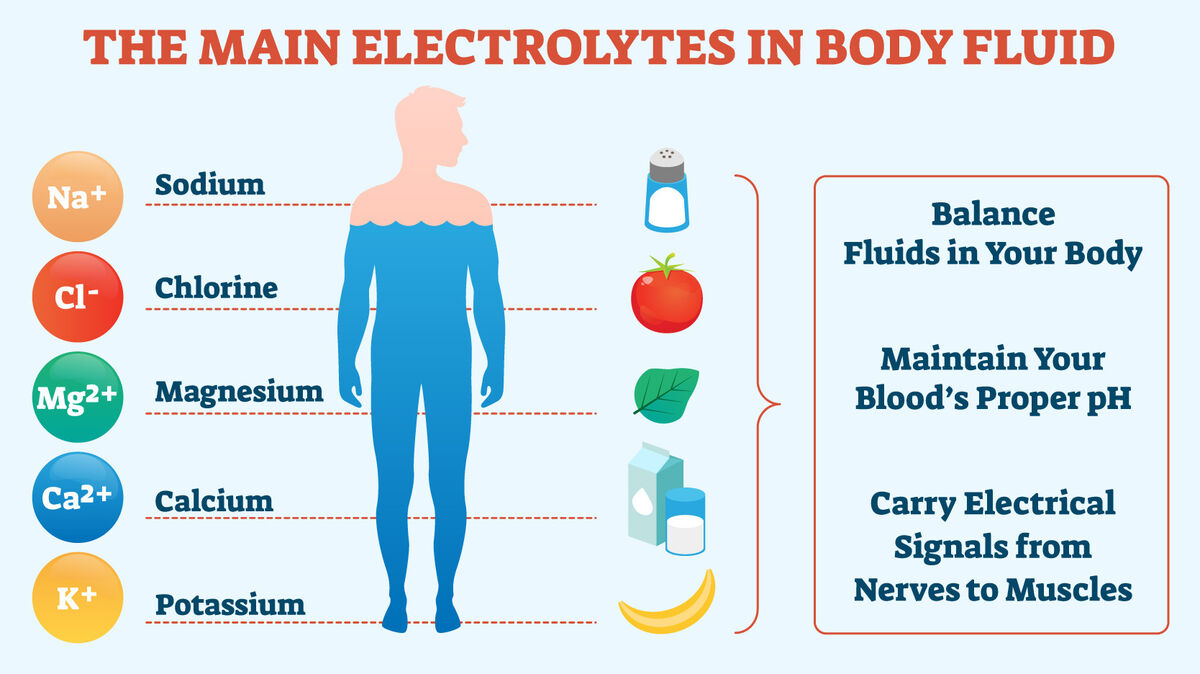Electrolytes are minerals that dissolve in bodily fluids and carry an electric charge. These charged particles, known as ions, play a critical role in maintaining physiological balance. They are essential for hydration, muscle function, nerve signalling, and overall recovery after training.
At Construct Fitness, we often see athletes and everyday lifters focusing on macros, mobility, and mindset. But when recovery stalls, one overlooked factor is electrolyte balance. Understanding what electrolytes are and how they function can help you train smarter and recover more consistently.
The Core Electrolytes and Their Functions

Electrolytes include sodium, potassium, magnesium, calcium, chloride, phosphate, and bicarbonate. Among these, four are especially relevant for active individuals:
- Sodium (Na⁺): Sodium helps regulate fluid balance by controlling the movement of water between cells. It is also essential for nerve impulse transmission and muscle contraction. When sodium levels drop due to excessive sweating, symptoms like dizziness, fatigue, and muscle cramps can occur.
- Potassium (K⁺): Potassium works closely with sodium to maintain cellular fluid balance. It supports muscle contraction, heart rhythm, and nerve function. Low potassium levels can lead to weakness, irregular heartbeat, and delayed recovery.
- Magnesium (Mg²⁺): Magnesium is involved in over 300 enzymatic reactions in the body. It plays a key role in muscle relaxation, energy production, and protein synthesis. Deficiency can contribute to muscle cramps, poor sleep, and increased inflammation.
- Calcium (Ca²⁺): Calcium is best known for its role in bone health, but it also facilitates muscle contraction and nerve signalling. Inadequate calcium can impair performance and increase the risk of injury.
Why Electrolytes Matter for Recovery
When you train, especially in humid environments or during high-intensity sessions, your body loses electrolytes through sweat. Replacing only water without replenishing electrolytes can dilute blood sodium levels, leading to a condition called hyponatremia. Even mild imbalances can affect recovery, mood, and performance.
Scientific Insights
- Electrolyte loss during exercise can impair thermoregulation, increase perceived exertion, and delay recovery (Sawka et al. 2007).
- Dehydration and electrolyte imbalance are linked to reduced cognitive performance, including slower reaction times and impaired memory (Masento et al. 2014).
- Supplementing with electrolyte solutions has been shown to improve fluid retention and reduce post-exercise fatigue compared to plain water (Choi et al. 2021).
Practical Takeaways
Electrolytes are not just for endurance athletes. They are for anyone who trains hard, sweats regularly, and wants to optimise recovery. Whether you are lifting, running, or doing HIIT, your electrolyte strategy should be intentional.
- Include electrolyte-rich foods like bananas, leafy greens, yoghurt, and nuts.
- Consider electrolyte supplements if training exceeds 60 minutes or occurs in hot conditions.
- Monitor signs of imbalance such as cramping, fatigue, and brain fog.
📍325 New Bridge Road #03-00 Singapore 088760
References
Choi DH, Cho JY, Koo JH and Kim TK (2021) ‘Effects of electrolyte supplements on body water homeostasis and exercise performance during exhaustive exercise’, Applied Sciences, 11(19): 9093, accessed 30 August 2025. https://doi.org/10.3390/app11199093
Masento NA, Golightly M, Field DT, Butler LT and van Reekum CM (2014) ‘Effects of hydration status on cognitive performance and mood’, British Journal of Nutrition, 111(10):1841–1852, accessed 30 August 2025. https://doi.org/10.1017/S0007114513004455
Sawka MN, Burke LM, Eichner ER, Maughan RJ, Montain SJ and Stachenfeld NS (2007) ‘American College of Sports Medicine position stand: Exercise and fluid replacement’, Medicine & Science in Sports & Exercise, 39(2):377–390, DOI: 10.1249/mss.0b013e31802ca597
White MG (2021) The Main Electrolytes in Body Fluid [image], YourDictionary, accessed 30 August 2025. https://www.yourdictionary.com/articles/examples-electrolytes-purpose



